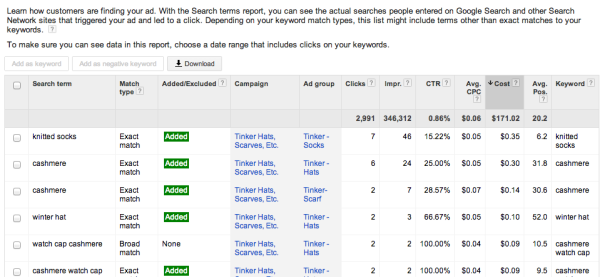10 Surprising Facts About “Keyword (Not Provided)” For Paid Search
Earlier this week, everyone went bananas over a rumor that paid search query data was disappearing and that third party tools providers would be slammed. In my article, I’ll clarify fact from fiction. Here are ten things you need to know about the Keyword (Not Provided) for paid search issue: 1. Can I Still Access […]
Earlier this week, everyone went bananas over a rumor that paid search query data was disappearing and that third party tools providers would be slammed.
In my article, I’ll clarify fact from fiction. Here are ten things you need to know about the Keyword (Not Provided) for paid search issue:
1. Can I Still Access My Paid Search Query Data?
Yes!
You can access your paid search query data, using the search terms report in AdWords. Just go to your keywords tab, and select the view search terms option. (Try it out yourself!)

2. Is The Search Term Report A New Feature In AdWords?
No. Contrary to reports, the report isn’t new, nor has it changed. It’s been around for many years now, but was once called the Search Performance Query Report. (The story on Search Engine Land has been updated since originally published.)
Just to add to the confusion, the API version of this report is still called the Search Performance Query Report.
3. What if I Use a Third Party Paid Search Platform?
Again, contrary to the rumors, users of third-party PPC management platforms such as Aquisio, Kenshoo, WordStream, Marin Software, etc., will not be impacted, since these tools all access search query data via the AdWords API.
For example both Kenshoo and WordStream use query data for keyword expansion tools, and that will continue to be available via the AdWords API.
4. So Then, What Actually Changed?
Just the referring URL on ads no longer contain the search query. Previously, when you clicked on an ad, Google inserted the search query into the referring URL string, like this:
Going forward, Google won’t be doing this for the majority of searches, which will affect analytics applications; but remember, you can still get that search query data directly in AdWords!
5. Why is Google Doing this?
As usual, they’re claiming user security is the impetus for this change (as it was on the non-paid side). But the more skeptical among us suspect that there could be other motives, too. Like if Google didn’t want competing party ad networks or search engines to have access to the search query data, this effectively shuts them down. Now, only customers can access their own search query data in AdWords.
6. Who Is Impacted By The Change?
Anyone who previously relied on parsing out search query data from a referring URL string is impacted. For example, a log file analyzer tool or analytics tool that is used to analyze referring URL strings. If you want access to your search query data, you need to get at it from AdWords, which hasn’t changed.
7. Why Should I Trust You Over Other Conflicting Reports?
Read the official Google announcement. (Check it out yourself!)
8. Are You Sure Paid Search Query Data Isn’t Going Away?
I re-iterate: There are no changes to the search query reports, either in the AdWords front end, or in the API. (Only analytics or other third-party software that parsed referring URL data will be affected.)
9. Is It Fair To Compare Organic Keyword Not Provided With What’s Happening To Paid Search Query Data Now?
I don’t think so. In my opinion, calling this development Keyword Not Provided for Ads is a terrible analogy. AdWords advertisers can still access search query data via the search term report, which for most people is the same way that they’ve accessed this data for many, many years. For example, if you want to do query expansion or negative keyword expansion, your workflow hasn’t changed at all.
10. So Pretty Much Nothing Is Changing Here For The Vast Majority Of SEMs?
Yes. It’s pretty much a non-issue for most of the people who actually do paid search work. But you wouldn’t know it based on the all the hysteria.
Contributing authors are invited to create content for Search Engine Land and are chosen for their expertise and contribution to the search community. Our contributors work under the oversight of the editorial staff and contributions are checked for quality and relevance to our readers. The opinions they express are their own.
Related stories
New on Search Engine Land
